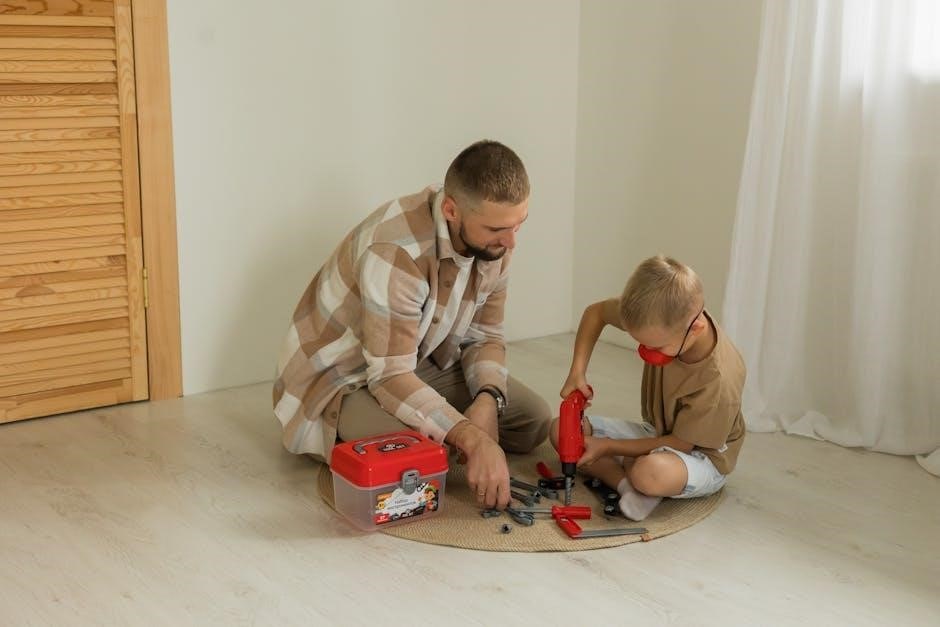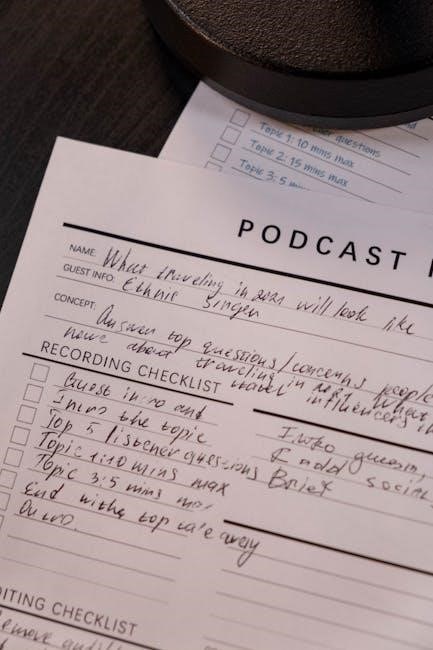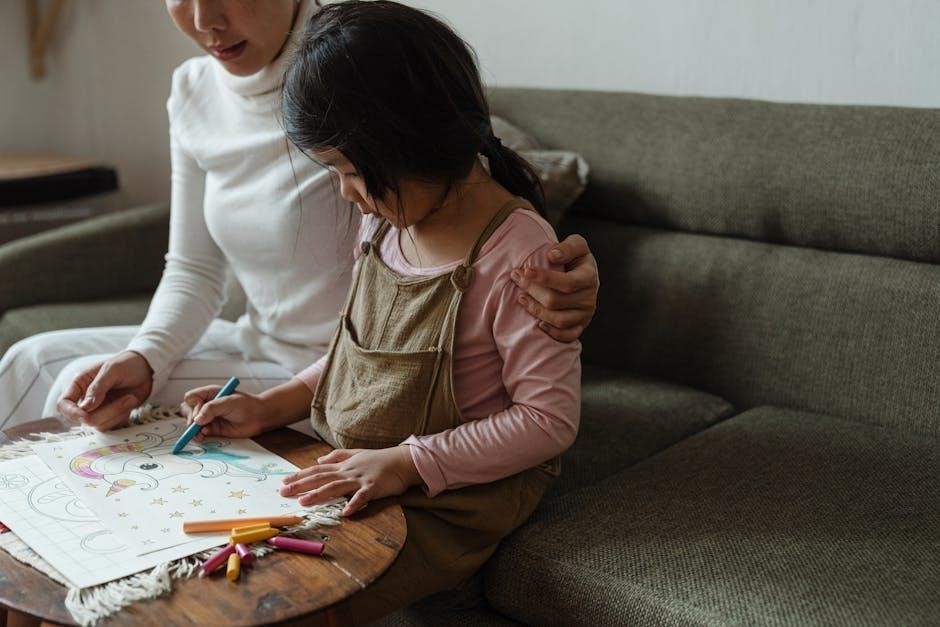Welcome to the Parent’s Guide to the Interview! This guide is designed to help parents navigate school or organizational interviews with confidence and preparedness.
1.1 Importance of Parental Involvement in Interviews
Parental involvement in interviews is crucial for showcasing your child’s background‚ values‚ and potential. It demonstrates your support and interest in their education‚ helping schools or organizations understand your child better. By participating‚ you provide insights into your child’s strengths‚ challenges‚ and goals‚ which are vital for their placement and growth. Your involvement also sets a positive tone‚ reinforcing your partnership with the institution. Additionally‚ it allows you to ask questions and clarify expectations‚ ensuring alignment with your child’s needs. Active participation highlights your commitment to their development‚ making the interview process more meaningful and effective for everyone involved.
1.2 Purpose of the Guide
This guide serves as a comprehensive resource to empower parents with the knowledge and strategies necessary to excel in interviews. It provides insights into the interview process‚ helping parents understand what to expect and how to prepare effectively. By offering practical advice on showcasing your child’s strengths‚ addressing common questions‚ and maintaining a positive demeanor‚ this guide aims to boost confidence and readiness. It also covers essential topics like body language‚ follow-up etiquette‚ and understanding next steps‚ ensuring parents are well-equipped to make a strong impression and advocate successfully for their child.

Understanding the Interview Process
Understanding the interview process is crucial for parents. It involves knowing the structure‚ preparation needed‚ and how to adapt to different interview formats and environments.
2.1 Types of Interviews (In-Person‚ Virtual‚ Panel)
In-person interviews take place face-to-face‚ allowing for direct interaction and non-verbal communication. Virtual interviews are conducted online‚ often via video conferencing‚ offering convenience but requiring technical preparation. Panel interviews involve multiple interviewers‚ which can feel intimidating but provides diverse perspectives. Each type has unique dynamics‚ and understanding these differences helps parents adapt their approach. In-person interviews emphasize body language and first impressions‚ while virtual interviews rely on clear communication and proper lighting. Panel interviews may involve rapid-fire questions‚ requiring quick thinking. Being aware of the format ahead of time allows parents to tailor their preparation and mindset for a successful experience.
2.2 What to Expect During the Interview

Preparing for the Interview
Effective preparation is key to a successful interview. Gather necessary information‚ organize your thoughts‚ and ensure you are well-informed to make a positive impression.
3.1 Researching the School or Organization
Researching the school or organization is a critical step in preparing for the interview. Start by understanding their mission‚ values‚ and goals to align your expectations. Review their curriculum‚ extracurricular activities‚ and teaching methods to gauge how they support your child’s growth. Look into their reputation through reviews‚ testimonials‚ or rankings. Familiarize yourself with their policies on discipline‚ safety‚ and inclusivity. Understanding their community involvement and events can also provide insights. This preparation not only helps you ask informed questions but also demonstrates your genuine interest and commitment. By knowing what the school stands for‚ you can highlight how your child and family align with their values‚ making the interview more meaningful and productive for both parties.
3.2 Reviewing Your Child’s Background
Understanding your child’s academic‚ extracurricular‚ and personal history is crucial for the interview. Review their achievements‚ challenges‚ and interests to speak confidently about their strengths and growth areas. Gather documents like report cards‚ awards‚ or progress reports to reference key accomplishments. Reflect on their personality traits‚ hobbies‚ and values to highlight what makes them unique. This preparation ensures you can provide insightful answers and showcase your child’s potential. Being familiar with their background also helps address any questions about their development or fit for the school or organization. It demonstrates your involvement and support‚ which are key factors in the interview process.
3.3 Practicing Common Interview Questions
Practicing common interview questions is essential for a smooth and confident conversation. Start by identifying potential questions related to your child’s strengths‚ challenges‚ and your parenting style. Reflect on your child’s achievements‚ interests‚ and areas for growth to articulate clear‚ sincere responses. Role-playing with a partner or in front of a mirror can help you refine your delivery and tone. Focus on questions about your child’s learning habits‚ social interactions‚ and emotional development. Additionally‚ prepare thoughtful answers about your expectations from the school and how you support your child’s education. This practice ensures you feel prepared and can showcase your child’s unique qualities effectively.

Common Interview Questions for Parents
Interviews often include questions about your child’s strengths‚ your parenting style‚ and your expectations. Be prepared to discuss their achievements and your support strategies openly.
4.1 Questions About Your Child
Interviewers often ask questions about your child to understand their personality‚ strengths‚ and challenges. Be prepared to discuss their academic achievements‚ hobbies‚ and interests. You may be asked about their behavior‚ social skills‚ and how they handle challenges. Honesty is key‚ as it helps the interviewer assess fit. Highlight their unique qualities and strengths‚ and share specific examples. This is an opportunity to showcase your child’s potential and how they can contribute to the school or organization. Being specific and sincere will leave a positive impression. Avoid exaggerating or focusing solely on weaknesses. Instead‚ present a balanced view that reflects your child’s true character.
4.2 Questions About Your Parenting Style
During interviews‚ you may be asked about your parenting style to understand how you support your child’s development. Be prepared to discuss your approach to discipline‚ communication‚ and encouragement. Interviewers often inquire about how you foster independence‚ handle challenges‚ and promote learning at home. They may also ask about your involvement in your child’s education and extracurricular activities. Be honest and specific‚ highlighting consistent routines‚ open dialogue‚ and positive reinforcement. For example‚ you might share how you encourage curiosity or help your child set goals. Demonstrating a balanced and nurturing approach will show your commitment to your child’s growth and readiness to partner with the school or organization.
4.3 Questions About Your Expectations
During the interview‚ you may be asked about your expectations for your child’s education‚ academic success‚ or social development. Schools want to understand your vision for your child and how it aligns with their mission. Be prepared to discuss your hopes for their future‚ such as academic achievements‚ personal growth‚ or extracurricular involvement. Additionally‚ you may be asked about your expectations for communication with teachers or the level of support you anticipate for your child. It’s important to be realistic‚ clear‚ and focused on your child’s well-being while demonstrating that you are a collaborative partner in their education.
- Be specific about your goals for your child.
- Emphasize your commitment to their development.
- Show openness to the school’s approach and values.
Aligning your expectations with the school’s philosophy will show that you are a thoughtful and engaged parent.

Tips for Acing the Interview
Be genuine‚ emphasize your child’s strengths‚ and express enthusiasm. Prepare thoughtful questions and actively engage in the conversation to leave a positive impression.
5.1 Being Honest and Authentic
Being honest and authentic during the interview is crucial. Interviewers aim to understand your child and your family dynamics‚ so candor builds trust. Avoid exaggerating or misrepresenting facts‚ as this can lead to misunderstandings. Authenticity shows integrity and helps the school or organization assess whether your child is a good fit. Share your child’s strengths and challenges openly‚ providing specific examples. Discuss your parenting style truthfully‚ highlighting your values and approaches. Honesty fosters a positive relationship and ensures alignment between your expectations and the institution’s offerings. Remember‚ authenticity is key to making a genuine connection and creating a lasting impression.

5.2 Showcasing Your Child’s Strengths
Highlighting your child’s strengths during the interview is essential to demonstrate their potential and fit for the school or organization. Be prepared to discuss their academic achievements‚ extracurricular activities‚ and personal qualities. Share specific examples that showcase their talents‚ such as leadership roles‚ creative abilities‚ or kindness. Emphasize their unique qualities and how they contribute positively to a community. Avoid exaggeration; instead‚ focus on genuine accomplishments. Discuss their interests and how they align with the school’s values or programs. Balancing pride with humility will present your child in a positive light. Remember‚ the goal is to help the interviewer understand how your child can thrive and contribute. This opportunity allows you to paint a vivid picture of their personality and capabilities‚ making them stand out.
5.3 Demonstrating Enthusiasm and Interest
Demonstrating enthusiasm and interest during the interview is crucial for making a positive impression. Show genuine excitement about the opportunity and express confidence in your child’s potential. Be specific about what excites you about the school or organization‚ such as its values‚ programs‚ or community. Ask insightful questions to show your engagement and curiosity. Express eagerness for your child to contribute to and benefit from the environment. Highlighting your own involvement in your child’s education can also showcase your dedication. Remember‚ your passion and interest can reflect positively on your child and your family’s commitment to success. Stay positive‚ engaged‚ and authentic throughout the conversation.

Involving Your Child in the Interview
Involving your child in the interview allows them to showcase their personality‚ share their thoughts‚ and demonstrate confidence‚ helping them understand the importance of their active participation.
6.1 Preparing Your Child for the Interview
Preparing your child for the interview is crucial to help them feel confident and ready. Start by discussing the purpose of the interview and what to expect. Encourage your child to share their strengths‚ interests‚ and goals. Role-play common questions they might be asked‚ such as their hobbies or why they’re excited about the school. Teach them to listen carefully and respond thoughtfully. Remind them to use good manners‚ maintain eye contact‚ and speak clearly. Avoid putting too much pressure on them; focus on helping them be their authentic selves. Encourage honesty and positivity‚ ensuring they understand the importance of the interview without feeling overwhelmed.
- Discuss the interview’s purpose and format.
- Practice answering questions together.
- Emphasize the value of honesty and positivity.
- Keep the preparation light and supportive.
6.2 Encouraging Your Child to Ask Questions
Encouraging your child to ask questions during an interview is a great way to showcase their curiosity and engagement. Start by discussing potential questions they might have‚ such as asking about the school’s environment‚ activities‚ or expectations. Role-play scenarios where they can practice articulating their thoughts clearly. Emphasize that there are no “wrong” questions and that asking questions demonstrates interest and confidence. Remind them to listen actively and respond thoughtfully. By fostering this habit‚ your child will not only make a positive impression but also gain valuable insights into what to expect. Encourage them to be honest and authentic in their inquiries‚ showing genuine interest in the opportunity. This preparation will help them feel more comfortable and confident during the actual interview.
6.3 Helping Your Child Make a Good Impression
Helping your child make a good impression during an interview is crucial. Start by teaching them basic etiquette‚ such as greeting the interviewer politely and maintaining eye contact. Encourage them to dress neatly and appropriately for the occasion. Remind them to sit up straight‚ smile‚ and use respectful language. Role-play scenarios to build their confidence and help them practice answering questions clearly and concisely. Avoid overpreparing‚ as it may make them seem rigid. Instead‚ emphasize being genuine and showing enthusiasm for the opportunity. Encourage them to ask questions if they feel comfortable‚ demonstrating curiosity and engagement. Most importantly‚ reassure them that it’s okay to be nervous and that their uniqueness is their strongest asset.

Body Language and First Impressions
Body language and first impressions play a crucial role in interviews. Positive non-verbal cues‚ like maintaining posture‚ eye contact‚ and smiling‚ can create a welcoming and confident atmosphere for both you and your child.
7.1 The Role of Non-Verbal Communication
Non-verbal communication plays a significant role in interviews‚ as it conveys confidence and sincerity. Body language‚ facial expressions‚ and gestures can greatly influence first impressions. Maintaining eye contact demonstrates attentiveness and honesty‚ while open posture signals approachability. A firm handshake and a warm smile can also create a positive atmosphere. Parents should be mindful of these cues‚ as they often speak louder than words; By aligning non-verbal signals with verbal responses‚ parents can reinforce their messages and build trust with interviewers. Awareness of these elements ensures a cohesive and authentic presentation of oneself and their child.
7.2 Dressing Appropriately
Dressing appropriately for an interview is essential to make a positive first impression. Choose attire that reflects the organization’s culture—whether formal‚ business casual‚ or relaxed. Opt for clean‚ well-fitted clothing that exudes professionalism and respect. Avoid overly flashy accessories or casual items like jeans or sneakers. Ensure your outfit is modest and polished‚ as it demonstrates your seriousness about the opportunity. Pay attention to grooming‚ ensuring hair is neat and nails are clean. Dressing appropriately shows respect for the interviewer and the process. Encourage your child to dress neatly as well‚ fostering a united and prepared appearance. Remember‚ first impressions matter‚ so invest time in selecting the right attire for the occasion.
7.3 Maintaining Eye Contact
Maintaining eye contact during an interview is crucial for building trust and showcasing confidence. It demonstrates attentiveness and sincerity‚ helping you connect with the interviewer. Consistent eye contact shows you are engaged and genuine‚ which can positively influence the interviewer’s perception. However‚ avoid staring intensely‚ as it may come across as aggressive. Instead‚ aim for a natural flow‚ breaking eye contact occasionally to glance at notes or the surroundings. Practicing eye contact beforehand‚ even in front of a mirror or with a friend‚ can help you feel more comfortable. Remember‚ cultural differences may influence expectations‚ so be mindful of norms. Good eye contact enhances your credibility and shows respect for the opportunity.

Following Up After the Interview
Following up after the interview is crucial to show appreciation‚ express continued interest‚ and understand next steps in the process.
8.1 Sending a Thank-You Note
A thank-you note after an interview is a thoughtful way to express gratitude and leave a positive impression. It demonstrates professionalism and appreciation for the opportunity.
Include key elements like thanking the interviewer for their time‚ expressing enthusiasm for the school or organization‚ and mentioning something specific discussed during the interview. Keep the tone sincere and professional.
Send the note within 24 hours of the interview‚ either via email or mail‚ depending on the interviewer’s preference. This small gesture can make a lasting impact and show your commitment to the process.
8.2 Following Up on the Decision
Following up on the decision after the interview is a crucial step in showing professionalism and genuine interest. After the interview‚ it’s important to wait a reasonable amount of time‚ typically a week or two‚ before reaching out. Parents should send a polite email or make a phone call to inquire about the status of the decision. This follow-up should reiterate appreciation for the opportunity and express eagerness to hear the outcome. If the decision is delayed‚ parents should ask for an estimated timeline. If the decision isn’t in your favor‚ it’s essential to thank the interviewers for their time and consider asking for feedback. This step not only shows grace but also demonstrates maturity and understanding. Remember‚ the follow-up is a final chance to leave a positive impression‚ so ensure it’s handled with gratitude and professionalism.
8.3 What to Do If the Outcome Isn’t Favorable
If the interview outcome isn’t favorable‚ it’s important to remain calm and reflective. Acknowledge any disappointment but avoid negative reactions. Seek feedback from the interviewer to understand their decision and identify areas for improvement. Use this as an opportunity to grow and refine your approach for future interviews. Discuss the outcome with your child in a positive light‚ emphasizing resilience and the importance of learning from experiences. Consider reviewing the interview process with your child to identify what could have been done differently. If appropriate‚ explore other opportunities or request a follow-up meeting to address any concerns. Stay proactive and focused on future possibilities.

Additional Tips for Parents
Stay positive‚ be approachable‚ and show genuine interest in the school. Ask insightful questions and listen actively to build a connection with the interviewer.
9.1 Being Open to Feedback
Being open to feedback is crucial during the interview process. It demonstrates your willingness to understand the school’s perspective and expectations. Listen actively to the interviewer’s insights about your child and their potential fit for the institution. Ask clarifying questions to ensure you fully grasp their observations. Feedback is a valuable tool for growth‚ allowing you to better support your child’s educational journey. By being receptive‚ you show collaboration and a commitment to your child’s success. This openness can leave a positive impression and strengthen your relationship with the school. Embrace feedback as an opportunity to learn and grow together.
9.2 Asking Questions During the Interview
Asking questions during the interview is a great way to demonstrate your engagement and interest in the school or organization. It also helps you gather valuable information to determine if the environment is the right fit for your child. Prepare a list of thoughtful questions in advance‚ such as inquiries about the curriculum‚ extracurricular activities‚ or support systems for students. Avoid asking about topics that were already covered in the interview or materials provided. Timing is key—ask your questions after the interviewer has shared their insights. This shows you are attentive and genuinely interested in understanding more about the opportunity. Your questions can also highlight your child’s needs and how the institution can address them‚ making the conversation more meaningful and personalized.
9.3 Highlighting Your Involvement in Your Child’s Education
Emphasizing your active role in your child’s education demonstrates your commitment and partnership with the school. Discuss how you support their learning‚ such as attending parent-teacher meetings‚ volunteering‚ or helping with homework. Share specific examples of how you encourage their academic and personal growth. Highlighting your involvement shows that you value education and are willing to collaborate with the school to ensure your child’s success. This not only reinforces your child’s strengths but also aligns with the school’s goals‚ making you a proactive and engaged parent. Be specific and sincere in your approach to leave a positive impression during the interview.
9.4 Understanding the Next Steps
After the interview‚ it’s important to understand the next steps in the process. Many schools or organizations provide a timeline for decision-making‚ which can help you plan accordingly. Stay informed about deadlines and any required follow-up actions. If your child is accepted‚ review the enrollment process and prepare for the transition. If not‚ consider seeking feedback to improve future opportunities. Open communication with the institution ensures clarity and helps you guide your child effectively. Understanding the next steps reduces uncertainty and allows you to support your child’s journey confidently. Stay organized and proactive to navigate the process smoothly.
Congratulations on completing the Parent’s Guide to the Interview! This guide has equipped you with essential insights to approach your child’s interview with confidence and clarity.
10.1 Summarizing Key Points
10.2 Encouraging Parents to Stay Confident and Prepared
Staying confident and prepared is key to a successful interview. Parents should trust in their ability to advocate for their child and showcase their strengths. Preparation builds confidence‚ so review potential questions and practice thoughtful responses. Remind yourself of your child’s achievements and the values you want to emphasize. A positive attitude and openness to dialogue will leave a lasting impression. Encourage your child to do their best and reassure them that this is a learning experience. By staying calm‚ focused‚ and genuinely enthusiastic‚ you’ll not only support your child but also demonstrate your commitment to their education and future.
